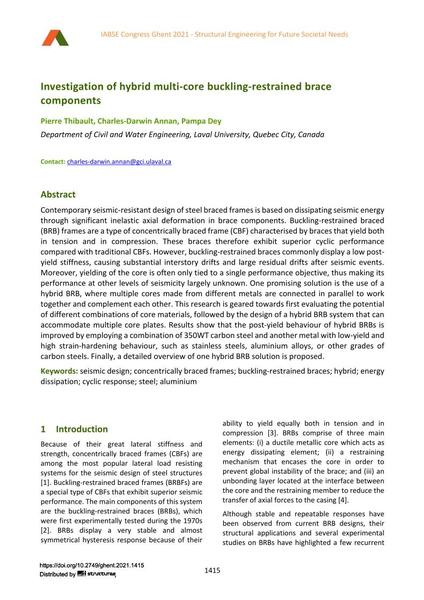Investigation of hybrid multi-core buckling-restrained brace components

|
|
|||||||||||
Bibliographic Details
| Author(s): |
Pierre Thibault
(Department of Civil and Water Engineering, Laval University, Quebec City, Canada)
Charles-Darwin Annan (Department of Civil and Water Engineering, Laval University, Quebec City, Canada) Pampa Dey (Department of Civil and Water Engineering, Laval University, Quebec City, Canada) |
||||
|---|---|---|---|---|---|
| Medium: | conference paper | ||||
| Language(s): | English | ||||
| Conference: | IABSE Congress: Structural Engineering for Future Societal Needs, Ghent, Belgium, 22-24 September 2021 | ||||
| Published in: | IABSE Congress Ghent 2021 | ||||
|
|||||
| Page(s): | 1415-1421 | ||||
| Total no. of pages: | 7 | ||||
| DOI: | 10.2749/ghent.2021.1415 | ||||
| Abstract: |
Contemporary seismic-resistant design of steel braced frames is based on dissipating seismic energy through significant inelastic axial deformation in brace components. Buckling-restrained braced (BRB) frames are a type of concentrically braced frame (CBF) characterised by braces that yield both in tension and in compression. These braces therefore exhibit superior cyclic performance compared with traditional CBFs. However, buckling-restrained braces commonly display a low post- yield stiffness, causing substantial interstory drifts and large residual drifts after seismic events. Moreover, yielding of the core is often only tied to a single performance objective, thus making its performance at other levels of seismicity largely unknown. One promising solution is the use of a hybrid BRB, where multiple cores made from different metals are connected in parallel to work together and complement each other. This research is geared towards first evaluating the potential of different combinations of core materials, followed by the design of a hybrid BRB system that can accommodate multiple core plates. Results show that the post-yield behaviour of hybrid BRBs is improved by employing a combination of 350WT carbon steel and another metal with low-yield and high strain-hardening behaviour, such as stainless steels, aluminium alloys, or other grades of carbon steels. Finally, a detailed overview of one hybrid BRB solution is proposed. |
||||
| Keywords: |
steel seismic design energy dissipation concentrically braced frames buckling-restrained braces hybrid cyclic response aluminium
|
||||
| Copyright: | © 2021 International Association for Bridge and Structural Engineering (IABSE) | ||||
| License: | This creative work is copyrighted material and may not be used without explicit approval by the author and/or copyright owner. |
||||
